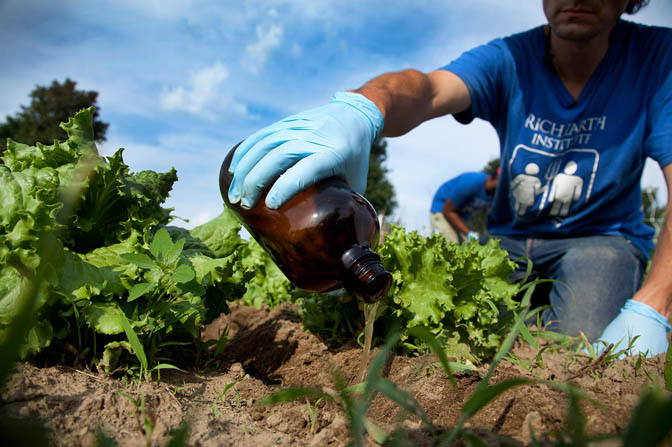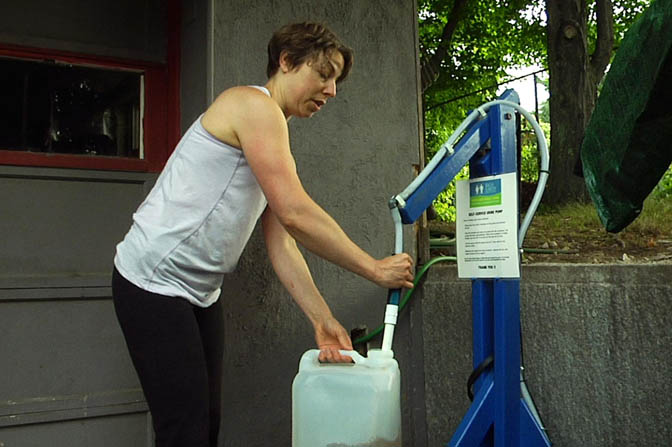
A $3M grant to turn urine into food crop fertilizer
Converting human urine into a safe fertilizer for agricultural crops is the goal of a new $3 million grant from the National Science Foundation.

Converting human urine into a safe fertilizer for agricultural crops is the goal of a new $3 million grant from the National Science Foundation.

Converting human urine into a safe fertilizer for agricultural crops is the goal of a new $3 million grant from the National Science Foundation.
University of Michigan engineering researchers lead the project, and they’ll work with colleagues at the Vermont-based Rich Earth Institute, U-M School of Natural Resources and Environment, U-M School of Public Health, University at Buffalo and an independent communications consultant.
As part of the effort, the team is installing special demonstration toilets in the G.G. Brown building on U-M’s North Campus. The toilets—a waterless urinal and a “source separating” flush toilet—will route urine to a holding tank where it will be treated. It will eventually be used to create fertilizers that will be used at the Matthaei Botanical Gardens. The toilet facilities will be open for use this fall.
The grant kicks off the nation’s largest program exploring the technology, systems requirements and social attitudes associated with urine-derived fertilizers. It expands work the group started a few years ago growing lettuce and carrots at a research plot in New England. Since 2014, the researchers have been exploring ways to remove bacteria, viruses and residual pharmaceuticals from urine to make it a viable fertilizer.
“We have methods for producing safe fertilizer from urine at the small scale, and now we are developing new technologies to meet the challenge of scaling up. At the same time, we will be assessing ways to introduce the idea of urine recycling into existing modes of thinking,” said Abraham Noe-Hays, director of research at the Rich Earth Institute.

Urine contains nitrogen, phosphorus and potassium—key nutrients that plants need to grow. Today, municipal water treatment systems don’t totally remove these nutrients from wastewater before it’s released into rivers and streams.
Excess nutrients can cause environmental and public health problems. At the same time, manufacturing synthetic fertilizer is expensive and energy intensive. This new endeavor has the potential to grow food in a way that saves money and resources and reduces water pollution. The project aims to enable advances in several areas:
“One is technology,” said Nancy Love, U-M professor of civil and environmental engineering. “But we can throw all the technology in the world at this problem and make no progress towards implementation unless the second area is advanced—and that’s the social behavior piece. We’re investigating the attitudes people hold towards the use of urine-derived fertilizers and will be testing and evaluating educational interventions.”
Love leads the project with Krista Wigginton, U-M associate professor of civil and environmental engineering.
On the technology side, researchers will test advanced urine-treatment methods such as charcoal filtration, which is also used for purifying drinking water; freeze-thaw concentration; pasteurization; and bio-nitrification, which uses bacteria to eliminate odors and turn the volatile ammonia in urine into stable nitrate. The team will also compare the public health and environmental risks of urine-derived fertilizers, synthetic fertilizers and biosolids—another name for treated sewage.
“We believe our work will take urine-derived fertilizer to a point where it’s safer than synthetic fertilizers and biosolids,” Love said.
While we owe our highly productive agriculture in large part to effective fertilizers, we don’t currently reclaim or recycle the nitrogen, phosphorus and potassium they contain. We essentially make new fertilizer for each use. Nitrogen fertilizer is produced via an energy-intensive process using natural gas. Phosphorus and potassium are derived from nonrenewable mined ore.

These elements become part of the plants they’re sprinkled around. If the plant is a vegetable, fruit or grain, the elements become part of us when we eat them. But we only retain those nutrients briefly, and then eliminate most of them in our urine. In the developed world, urine ends up in sewage treatment plants where the “treatment” often does not affect nitrogen or phosphorus.
One of the environmental consequences is algal blooms, which can kill fish, diminish recreation and even threaten human health and quality of life. A 2014 algal bloom in Lake Erie rendered the Toledo water supply hazardous, forcing nearly 500,000 people to find alternative water supplies for several days.
“Essentially, we’re discharging nitrogen and phosphorous into our waterways with one hand while the other hand obtains ‘new’ nitrogen and phosphorous from the environment at significant cost,” Wigginton said.
Turning urine into fertilizer closes the loop, recycling the nutrients from the food we eat back into agriculture, the researchers say.
The researchers will work with communications consultant Linda Macpherson of New Water Resources to explore whether they can change misconceptions and encourage new ways of thinking about a sustainable future, Macpherson said.
“Population growth and increased resource scarcity demand better stewardship of the resources we used to think of as wastes,” Macpherson said. “The adage ‘waste not, want not’ is no longer a tired saying but words to live by in a resource-limited future.”
The use of urine as fertilizer is hardly new. Various cultures have done it for hundreds, if not thousands, of years. The World Health Organization publishes guidelines for urine diversion and reuse. But they’re intended primarily for places with decentralized waste systems, not for places like the U.S. with sophisticated, centralized sewage processing systems.
Other contributors are: Glen Daigger, clinical professor of civil and environmental engineering; Rebecca Hardin, associate professor of natural resources; Joseph Eisenberg, professor of epidemiology; and Heather Goetsch and Andrea McFarland, doctoral students in civil and environmental engineering.